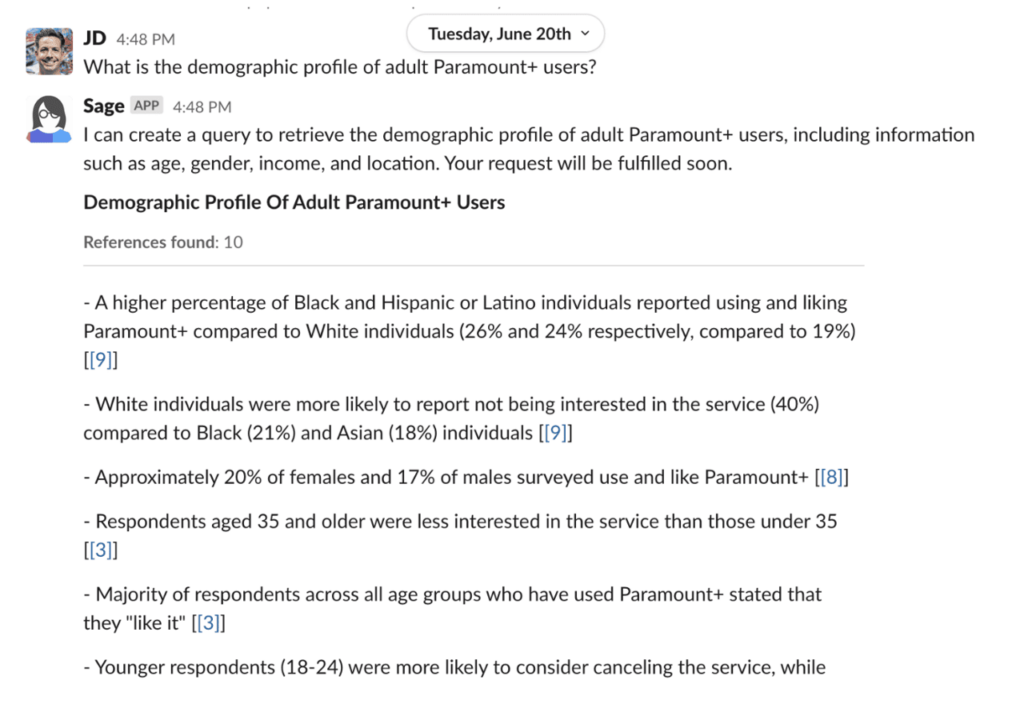We’ve been training for this our whole lives.
People are hyperventilating about AI these days, like it’s the beginning of a new frontier – and it is. But it’s also a kind of end-state.
To be sure, there would be no ChatGPT without data – or the Internet. When Google set out 25 years ago to “organize the world’s information,” they were simultaneously setting it free. Every book, study, article, and Wikipedia entry needed to first be captured, collated, and standardized. The creators of that content, eager to make it accessible for financial or societal gain, willingly forfeited it to the public domain.
And now here we are.
Entire businesses stand to be disrupted, if not decimated, by generative AI. Any company whose products or services are predicated on “scraping the Internet,” must be freaking out. Their competitive barriers, namely the technology and infrastructure they built to productize openly available data, are essentially gone. If they’re not investing massively in their own AI capabilities – and even if they are – their lead could vanish in a blink.
Then there’s the explosion of new startups chasing the gold rush of AI and the valuations that come with it. But how do you differentiate yourself when the underlying technology is effectively ubiquitous?
The good folks at the Wall St. Journal nailed it a couple weeks ago here: AI Startups Have Tons of Cash, but Not Enough Data. That’s a Problem.
It’s just not our problem.
The thesis of CivicScience was always rooted in the ownership and safeguarding of our data. Most survey companies are little more than brokers between a buyer and a paid respondent. They own nothing. We took the road less traveled.
We study millions of Nike customers, even though Nike isn’t a client (yet). But we can sell that data to Nike’s competitors, retailers, investors, and the media companies who serve their ads. We eat the cost, so it’s ours to use freely.
Admittedly, it took us a lot of time and money to build scale – much to the chagrin of some, who would’ve preferred we grab a quick buck from custom surveys or hand our data over to the ad exchanges, ownership be damned. Fortunately, we didn’t.
It all brought us to this moment. Now we have one of the largest, most valuable proprietary datasets in the world AND the magic of AI.
This is a “chatbot” we’re rolling out to clients later this summer, first through Slack and Microsoft Teams. We call her Sage:

Even as a prolific user of our platform that would’ve taken me ten minutes to do on my own. It took Sage less than one. And she’s getting smarter by the second. I can’t tell you how much easier it’s going to make writing this email every week, Dick jokes aside.
Royally speaking, AI is like a servant, a courtier.
Data is king.
Here’s what we’re seeing:
Consumer confidence had a remarkable jump over the past two weeks. Our Economic Sentiment Index saw its biggest increase since last July, as U.S. consumers feel the softening of inflation and continued strength in the job market. All five of our key indicators rose, with confidence in finding a new job (up 3.1 points) and overall economic outlook (up 2.7 points) leading the charge. The (temporary) pause on interest rate bumps seems to have resonated with consumers as well. Let’s keep it up.

DoorDash could be disproportionately hurt by the return of student loan payments. In our ongoing tracking of consumers’ concerns and expected spending adjustments over the end of the student debt hiatus, it’s evident that certain sectors of the economy (and brands) will be impacted much more profoundly than others. One notable area of worry is the online food delivery space, where the prevalence of student debt among frequent users is very high. At the top of the list are DoorDash customers, but they’re not alone. With over $1.5 trillion in federal loan debt currently held by Americans, expect this to be something we write about a lot in the coming weeks. I’m also hosting a webinar on this topic next Thursday for anyone who wants to join. Sign up here.

Grown-ups are turning to recreational sports leagues to improve their overall well-being. Just under 10% of U.S. adults say they participate in some kind of organized sport, but that number could as much as double in the coming year, based on our tracking data. Interest is highest for pickleball, but softball and baseball are just behind. Thirty-four percent of league intenders answered ‘other,’ which means there’s a broad variety (golf wasn’t listed as an explicit option, which tells you I didn’t author the question). When you look at the main motivating factors behind this trend, it’s all about emotional, physical, and social wellness. Very cool.

The streaming video industry is hitting a plateau. After long being one of the more protected spending categories coming out of COVID, consumers are beginning to push back on the cost of streaming services. Any number of factors could be contributing, from the obvious impact of inflation (and coming student loan bills), to the myriad services to choose from, to the availability of ad-supported alternatives, to the lack of new content borne of the ongoing writer’s strike. All we know is that people are being more judicious – you can read all about it in this detailed study about the different platforms, pricing, and churn.

You should advertise more on high-quality news sites. We hear all the time from brands who are afraid to advertise alongside news content, for fear of being associated with certain types of divisive or controversial content. I get that – but all news sites aren’t created equal. We partnered on this powerful study with Ad Fontes Media, a tremendous organization that analyzes and rates the level of bias and quality of news sources. When we examined the readers and viewers of the highest quality outlets, suffice to say, they’re exactly the type of consumers most brands would love to have. You need to read it for yourself.

More awesome stuff from the InsightStore™:
- 3 Things to Know this week: Global conflicts and media attention, air purifiers and wildfires, and concerns over noise pollution;
- Gen Z are the most prolific users of social media, but also the most likely to monitor and meter their time using it;
- People who work out at home, work out more;
- Sunscreen usage and SPF preferences are up this year and, per usual, women are smarter than men;
- 5 remarkable differences between Yeti and Hydro Flask users.
The most popular questions this week:
- Have you ever quit your job immediately upon receiving bad news?
- Do you tend to take advice from older people or younger people more seriously?
- Do you think the Loch Ness Monster exists or not?
- Do you think people tend to behave worse on an airplane than they would in other public spaces?
- Do you personally believe social media is a positive or negative force in the world?
Answer Key: No, I’ve never quit a job; I mean, does anyone actually answer “younger?”; No; Nah, assholes are assholes, wherever they are; Tough question, but probably negative.
Hoping you’re well.
JD
Not on the list to receive this weekly email? Sign up here. If you are new to this list, check out our Top Ten to get caught up.








